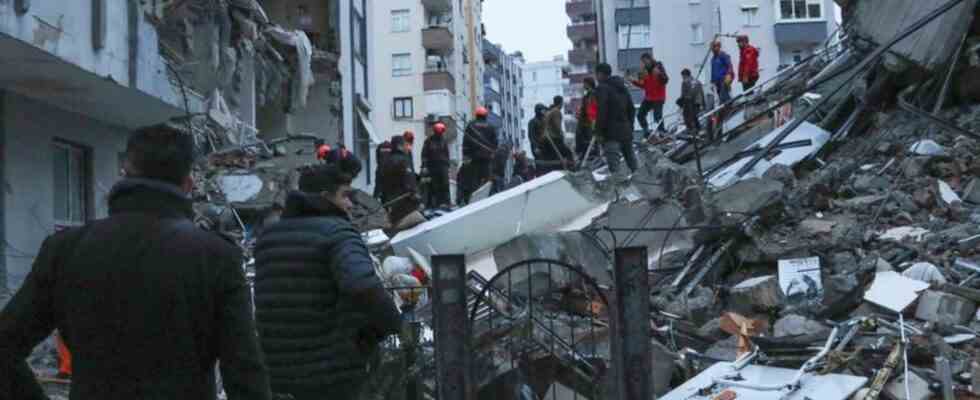First it trembles at night, then again at midday: The full extent of the disaster on the Turkish-Syrian border is not yet foreseeable, the number of deaths is rising and rising. International aid is starting.
After the devastating earthquakes in Turkey and Syria, the death toll has risen to around 1,800. 1,014 people were killed in Turkey, the civil protection service Afad said on Monday afternoon. More than 7000 people were injured. Thousands of buildings collapsed in the tremors in south-east Turkey alone. Videos from several cities in the area showed partially completely destroyed streets.
In Syria, the death toll rose to more than 780, according to Deputy Health Minister Ahmed Dhamirijeh and the White Helmets rescue organization. More than 2,200 people were injured in the disaster in the civil war country.
During the night, an earthquake with a magnitude of 7.7 shook Turkey and Syria, followed by a number of aftershocks – one of them with a magnitude of 7.6, as Afad announced. Both earthquakes had their epicenter in Kahramanmaras province. The tremors were felt in several neighboring regional countries, including Lebanon, Iraq, Cyprus and Israel.
According to the civil protection agency Afad, the epicenter of the first severe quake was in the province of Kahramanmaras near the Syrian border. There were a large number of aftershocks. Rain, snow and cold made rescue operations difficult. Chancellor Olaf Scholz said Germany would of course send help.
First disaster relief already on the way
The EU Center for Disaster Relief coordinates the deployment of European rescue workers to Turkey. The first teams from the Netherlands and Romania are already on their way, said the responsible EU Commissioner Janez Lenarcic. In a statement, Slovenia and EU foreign policy chief Josep Borrell spoke of one of the strongest earthquakes in the region for more than 100 years.
According to the state news agency Sana, buildings in numerous cities in Syria collapsed. Rescue teams tried to pull people out of the rubble during the night and at dawn. According to Sana, the head of the National Earthquake Center said this was the strongest earthquake in Syria since 1995. President Bashar al-Assad called his cabinet for an emergency meeting.
The loss of life and destruction resulting from the earthquake is heartbreaking, UN-Syria mediator Geir Pedersen wrote on Twitter. Many people in the region were already suffering enormously and for a very long time.
Unesco World Heritage damaged
Among the collapsed buildings in Turkey was a hospital in the city of Iskenderun, in addition to residential houses. According to the state news agency Anadolu, the castle in the city of Gaziantep was also badly damaged. It is a Unesco World Heritage Site.
Because of the communication bottlenecks, people in Turkey were called upon to make phone calls online and not via the cell phone network, so that buried people can be reached first. The temperatures in the affected areas are currently often in the minus range. In some places it snowed heavily.
The state broadcaster TRT showed how people were freed from the rubble in the snow in the city of Iskenderun.
In addition to blood donations, aid organizations and communities in the affected regions also called for donations in kind and asked for things like blankets, heaters, winter clothing, food packages and baby food.
Tremors felt as far as Israel and Lebanon
The earthquake was also felt in Lebanon, which borders Syria. In the capital Beirut, some residents fled their homes in haste. The earthquake was also felt in Israel. According to the Israeli police, there were no injuries or damage.
Despite the severe tensions with Turkey, Greece agreed to send rescue teams to the earthquake area – as did Finland and Sweden despite the Turkish blockade of their NATO applications. Israel also wants to help Turkey.
The EU leaders were shaken. “We mourn with the families of the victims,” wrote EU Commission President Ursula von der Leyen on Twitter. She promised the people of Turkey and Syria solidarity from the EU. Support is already on the way and we are ready to “continue to help in any way we can”. The EU Center for Disaster Relief had previously started coordinating the deployment of European rescue workers to Turkey.
Similar to von der Leyen, EU Council President Charles Michel and the President of the European Parliament, Roberta Metsola, also made statements.
In Italy, civil defense issued a tsunami warning on Monday night, which was withdrawn a few hours later. NATO Secretary General Jens Stoltenberg wrote on Twitter that Turkey’s NATO partners were ready to mobilize support.
Admonition to caution
The Foreign Office in Berlin urged caution and advised to follow the instructions of the local authorities.
Turkey is repeatedly affected by severe earthquakes. Two of the largest continental plates meet there: the African and the Eurasian. In fact, most of the Turkish population lives in constant danger of earthquakes.
In October 2020, more than 100 people died in Izmir in one of the most serious earthquakes in recent years. In 1999, Turkey was hit by one of the worst natural disasters in its history: a magnitude 7.4 earthquake in the region around the north-western industrial city of Izmit claimed the lives of more than 17,000 people. Experts are also expecting a strong earthquake in Turkey’s largest city, Istanbul, in the near future.

